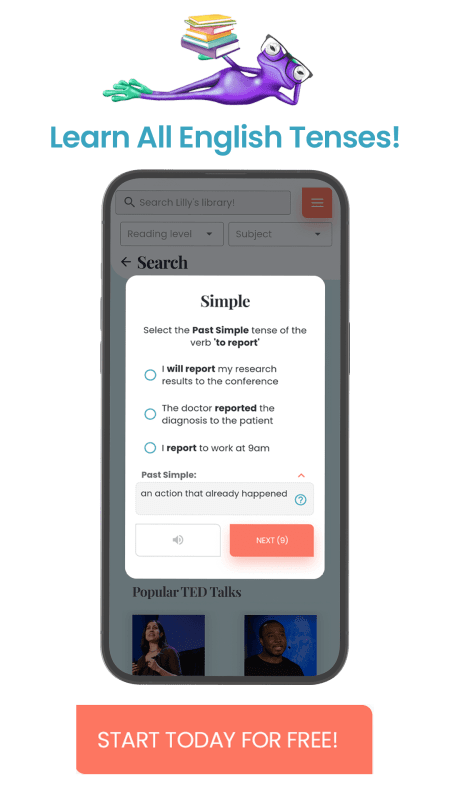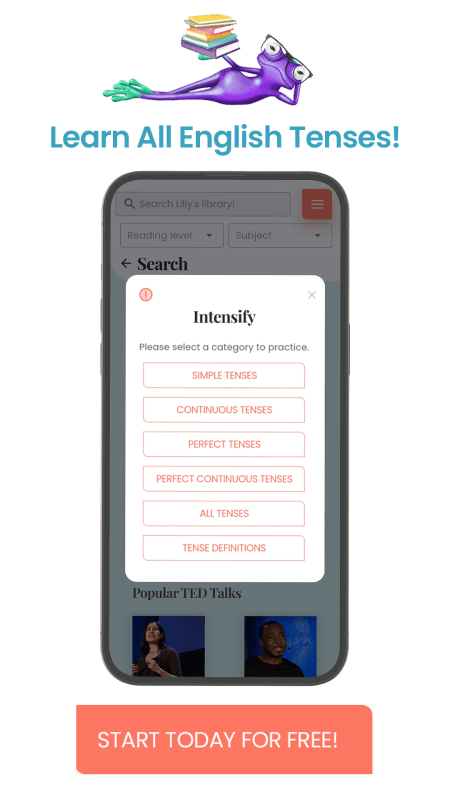Grammar
Simple Future
What is Simple Future?
Verb tenses signify the time (and its consequent aspects) that an action or condition occurs. The future tense, as the name suggests, indicates actions and events that will take place at some point. We use the future tense to denote occurrences that are either planned or predicted. The simple future tense points at actions and events that haven’t happened yet.
The following is the formula or structure when using the simple future tense:
Subject + will/shall + Main Verb + Res of the sentence
The simple future tense is formed by using the auxiliary or helping verbs will or shall. In addition, we can also use it to ask questions about future happenings or state that one future action will occur before another.
Let’s take a look at the following examples:
1. Anne will join us for lunch.
2. The kids will visit their grandparents in the summer.
3. Will you analyze the specs of our recently acquired units?
4. How will you go to work if the bus drivers are on strike?
5. He won’t apologize for the mishap and I believe he shouldn’t have to.
Simple Future Uses and Rules
In this segment, we will look at two tables that detail the rules and uses of the simple future tense, and how the verbs in this tense are conjugated in different sentence structures. First, let’s look at the breakdown of how the simple future is used:
| Uses | Examples |
|---|---|
| For decisions made at the moment of speaking | – That looks like a great event. I will book a ticket. – My back hurts. I will get a massage. – I need to talk to you. I will come by after lunch. |
| For unplanned or unpreventable future actions and events | – The children will miss you. – Just wait, karma will come. – It looks like spring will be here early. |
| For plans, expectations, and predictions | – You won’t regret your decision. – Around 100 guests will be there. – I’m afraid it will hurt a little. |
| With clauses (time, conditional, and purpose) | – When the right time comes, Orris will reveal his secret. – If Nadia doesn’t stop, we will take action. – I will call as soon as we reach the island. |
The following rules are followed when using the simple future tense in different sentence structures:
(Important: Native English speakers normally use the contraction “won’t” in conversation or informal settings. We’ll use this contraction in some of the following simple future tense formulas. Spelling it out as “will not” is also correct, but this is more commonly used in academic or professional settings.)
| Sentence Structure | Formula | Examples |
|---|---|---|
| Negative | Subject + won’t + Base form of verb + Rest of the sentence. | – Fia won’t write the speech. – Jacob won’t honor the agreement. – She won’t stop the article from being printed. |
| Interrogative | Will + Subject + Base form of verb + Rest of the sentence? | – Will they decide in favor of the majority? – Will Glinda purchase everything on the wish list? – Will his guests stay in the same hotel? |
| Interrogative Negative | Won’t+ Subject + Base form of verb + Rest of the sentence? (note: this sentence structure is typically used to confirm a future action or expectation; in some contexts, you can also use this as an indirect command.) | – Won’t you be a darling and get me some fresh linens? – Won’t Ramil oversee the operation? – Won’t Celia cover these topics in tomorrow’s lesson? |
| Interrogative with Question Word | Question word + will + Subject + Base form of the verb + rest of the sentence? (In some instances where “who” is the question word, the subject may appear after the main verb.) | – When will they sign the provisions that we drafted? – Who will replace Renata’s old position now that she’s been promoted? – Who will your manager take with him to the convention? |

Examples of Simple Future Tense Verbs
1. Affirmative Sentence
- Jaxa will call an Uber, don’t worry.
- Tarquin will ensure that you get the best deal.
- He will compile all the video clips from the trip.
- We will unpack our luggage tomorrow.
- Samson will submit his portfolio in the afternoon.
2. Negative Sentence
- Kira promised she won’t make the same mistake again.
- She got a call from work so she won’t join us in the gazebo.
- You won’t believe what happened to me at the store today.
- Unfortunately, the new stock won’t arrive until next month.
- I won’t ask you to do this if I didn’t believe in your abilities.
3. Interrogative (affirmative)
- Will he receive the residuals within the day?
- Will Dierdre design the new line of shoes?
- Will they bring enough tables and chairs for the memorial?
- Will Robert fix the door handle in the break room today?
- Will Gina present the award for Rising Star or Best in Show?
4. Interrogative (negative)
- Won’t the snake attack you?
- Won’t Ryu host next month’s gala?
- Won’t they auction the Red Collection on the night of the feast?
- Won’t they deliver the samples this afternoon?
- Won’t Ken’s dog bite if I entered the house without him?
5. Interrogative (with Question Words)
- Who will march with me on Bonfire Night?
- Where will they keep the packages?
- Who will they appoint to assist the doctors in the gymnasium?
- When will we greenlight funding for the talent scouts?
- What will Jared contribute to the acquisition department?
Simple Future Exercises with Answers
Exercise on Simple Past
Change the verbs in parentheses into their correct simple future form to complete the sentences.
1. A: Phone’s ringing. B: I (get) _______________ it.
2. Melissa believes summer (come) _______________ early this year.
3. You (move) _______________ to the new apartment next week, right?
4. Myka promised he (be) _______________ there before lunch.
5. A: The music’s too loud. B: I (turn) _______________ it down.
6. (not/the meeting/begin) ____________________ at 9 a.m.?
7. If Michael gets the new Lego collection for Christmas, he (be) _______________ overjoyed.
8. Nano (drive) _______________ us to the meeting place.
9. Who (collect) _______________ the donations this coming Saturday?
10. They (reimburse) _______________ the expenses of the trip, including the hotel.
Answers
1. A: Phone’s ringing. B: I will get it.
2. Melissa believes summer will come early this year.
3. You will move to the new apartment next week, right?
4. Myka promised he will be there before lunch.
5. A: The music’s too loud. B: I will turn it down.
6. Won’t the meeting begin at 9 a.m.?
7. If Michael gets the new Lego collection for Christmas, he will be overjoyed.
8. Nano will drive us to the meeting place.
9. Who will collect the donations this coming Saturday?
10. They will reimburse the expenses of the trip, including the hotel.

Simple Future List
Below is a list of more examples of simple future tense verbs according to their uses:
For decisions made at the moment of speaking
- They just said they will open the shop late today.
- I’m running a fever. I will take some medicine.
- Won’t you hurry to the store now?
- Mom’s busy. I will cook dinner tonight.
- We didn’t use everything. We will take the excess to the control floor.
For unplanned or unpreventable future actions and events
- Benjamin will cry after seeing this dedication video.
- We have no time. The play will begin soon.
- They won’t enjoy this ride, I’m sure of it.
- Perhaps Aldrich will draw it instead of Nathan.
- Everybody’s saying you will sing tonight.
For plans, expectations, and predictions
- The association will build a school here.
- We will need volunteers for the feeding program.
- Something tells me the market will collapse in the next few days.
- They will have a baby by this time next year.
- Dad will introduce his new girlfriend at the party.
With clauses (time, conditional, and purpose)
- If you eat all of that, you will fall ill.
- Vanya will tell you the details as soon as you finish the test.
- When you’re ready, I will teach you.
- Will you wash the dishes if I cook?
- As soon as they have the warrant, they will raid the building.
Advice for ESL Students & English Language Learners
As any English language learner will attest, studying verb tenses can be extremely confusing, mostly because there are quite a lot. Tenses indicate activities, events, states of being, or conditions as they happen at different points in time. You must already know the three main tenses: present, past, and future. Moreover, each of the three types has 4 aspects: simple tense, continuous or progressive tense, perfect tense, and perfect continuous or progressive tense. There’s a total of 12 tensions that make up the English language. Verbs also appear similarly, though each conjugation corresponds to specific rules. Understanding their functions is a must to eliminate confusion.
Using tenses correctly leads to accurate storytelling, as each tense relates to a distinctive meaning. For example, the sentences “I am studying”, “I studied”, and “I will study” have different meanings. First, “am studying” describes an action that’s happening at the moment. Second, “studied” expresses a completed action. Lastly, “will study” refers to an action that hasn’t happened yet.
In reality, only 4 tenses are generally used in conversation or informal English. These are the 3 simple tenses (simple present, simple past, and simple future) and the present continuous or present progressive tense. It doesn’t mean that other tenses aren’t as important. Studying them is useful for advanced tasks in academic and professional situations.
Additionally, it is important for learners to properly understand simple past, past progressive and simple future.

Common Errors Made by English Learners
It’s a struggle for English students to speak English lengthily, i.e telling a story or giving an explanation. The most common mistake is mixing tenses. The main reasons for this are first, English language learners are translating directly from their native language (some languages don’t conjugate verbs); second, they’ve created speaking habits that are grammatically incorrect. Third, their language level isn’t enough for self-correction. Study the following list to avoid following or making similar mistakes.
| Common Errors | Correct Form | Reason |
|---|---|---|
| I’ll call you when I’ll arrive home | I’ll call you when I arrive home. | When we indicate the future in adverbial and conditional clauses, the present simple is used. |
| Someone’s at the door. ~ OK, I’m going to get it. | Someone’s at the door. ~ OK, I will get it. | Remember that future actions decided at the time of speaking mostly use “will.” We can use the “going to” future if the action was planned in the past. |
| She won’t probably feel happy about it. | She probably won’t feel happy about it. | Definitely and probably are adverbs that are used before won’t and after will. |
Learning Strategies and Best Practices with the Simple Future Tense
The most effective learning strategies for simple future tense is to:
- Study the basic rules of the simple future tense.
- Apply what you’ve learned consistently by using them in English conversations.
- Know the common errors to avoid the same pitfalls.
| Learning Strategies | Explanation |
|---|---|
| Language Lists | Grammar lists, tables, and charts can present concepts like tenses in a comprehensive way. These resources are extra useful, not only because they are commonly stripped down to language essentials but they’re also convenient to use in comparisons, as references, and as review materials. |
| Language Exposure | Books and videos give valuable insight into how native English speakers use the language in different situations and requirements. They will widen your background knowledge in formal and conversational English. Substantial exposure to these materials can improve your fluency more meaningfully as you’ll be able to follow and acquire language cues, expressions, and methods in sentence construction. It’s recommended to use audiovisual tools with purpose, which means you should listen actively and take notes on how people articulate themselves. Many English students have achieved advanced proficiency through language mimicry and vigilant comprehension. |
| Language Exchange | An English language learner can acquire advanced grammar skills and still struggle with speaking if they don’t practice. Make an effort to use what you’ve learned in actual conversation, which needs to be regular or consistent. Language theory without practical use is extremely limiting So talk whenever you have the chance, both with native and non-native English speakers. In time, your fluency will improve greatly. |

Simple Future Tense Frequently Asked Questions

Learn from History – Follow the Science – Listen to the Experts
For learners of all ages striving to improve their English, LillyPad combines the most scientifically studied and recommended path to achieving English fluency and proficiency with today’s most brilliant technologies!
What’s the one thing that makes LillyPad so special? Lilly! Lilly’s a personal English tutor, and has people talking all over the world! Lilly makes improving your English easy. With Lilly, you can read in four different ways, and you can read just about anything you love. And learning with Lilly, well that’s what you call liberating!
Additionally, the platform incorporates goal-setting capabilities, essential tracking & reporting, gamification, anywhere-anytime convenience, and significant cost savings compared to traditional tutoring methodologies.
At LillyPad, everything we do is focused on delivering a personalized journey that is meaningful and life-changing for our members. LillyPad isn’t just the next chapter in English learning…
…it’s a whole new story!
Do you want to improve your English? Visit www.lillypad.ai.


